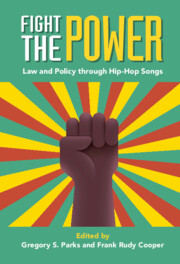Book contents
- Fight the Power
- Fight the Power
- Copyright page
- Dedication
- Contents
- Contributors
- Acknowledgments
- Introduction Still Fighting the Power
- Part I Policing
- 1 From “Fuck tha Police” to Defund the Police: A Polemic, with Elements of Pragmatism and Accommodation, Hopefully Not Fatal, As Black People Hope About Encounters with the Police
- 2 Hip-Hop and Traffic Stops
- 3 “Black Cop”: It’s a Blue Thing (or Is It?)
- 4 “Illegal Search”: Race, Personhood, and Policing
- 5 “Cops Shot the Kid”: Police Brutality, Mass Incarceration, and the Reasonableness Doctrine in Criminal Law
- Part II Imprisonment
- Part III Genders
- Part IV Protests
- Index
4 - “Illegal Search”: Race, Personhood, and Policing
from Part I - Policing
Published online by Cambridge University Press: 20 January 2022
- Fight the Power
- Fight the Power
- Copyright page
- Dedication
- Contents
- Contributors
- Acknowledgments
- Introduction Still Fighting the Power
- Part I Policing
- 1 From “Fuck tha Police” to Defund the Police: A Polemic, with Elements of Pragmatism and Accommodation, Hopefully Not Fatal, As Black People Hope About Encounters with the Police
- 2 Hip-Hop and Traffic Stops
- 3 “Black Cop”: It’s a Blue Thing (or Is It?)
- 4 “Illegal Search”: Race, Personhood, and Policing
- 5 “Cops Shot the Kid”: Police Brutality, Mass Incarceration, and the Reasonableness Doctrine in Criminal Law
- Part II Imprisonment
- Part III Genders
- Part IV Protests
- Index
Summary
Roger Fairfax analyzes LL Cool J’s 1990 song, “Illegal Search,” as a precursor to later hip-hop critiques of policing. This song represented LL Cool J’s awakening to social consciousness in the 1990s. “Illegal Search” represented helped advance a narrative about policing that remains prominent in hip-hop to this day. “Illegal Search” might have been overlooked completely since the only track to follow is “Power of God,” a low-energy, spiritual offering that, while delivering a positive message, is perhaps the least familiar of the fourteen cuts on the album.“Illegal Search” surveys a number of discrete topics, including racial profiling, the manufacture and planting of evidence, police brutality, incarceration, and even seems to reference a specific case of police misconduct in New Jersey. The lyrics display the angst experienced by many African Americans who are subjected to law enforcement scrutiny simply because of their skin color. “Illegal Search,” with its literal, unobscured narrative, gives descriptive voice to the phenomenon we would later term “Driving While Black.”
- Type
- Chapter
- Information
- Fight the PowerLaw and Policy through Hip-Hop Songs, pp. 75 - 100Publisher: Cambridge University PressPrint publication year: 2022



